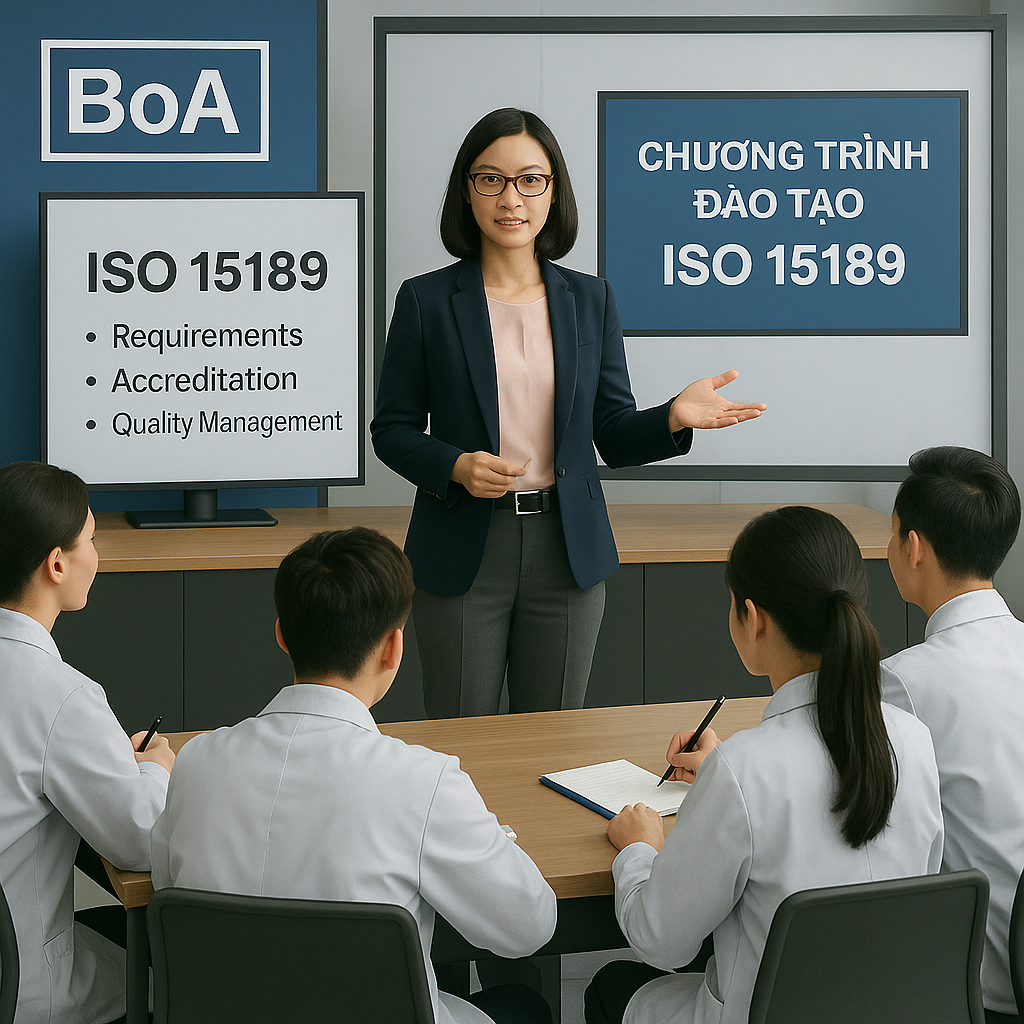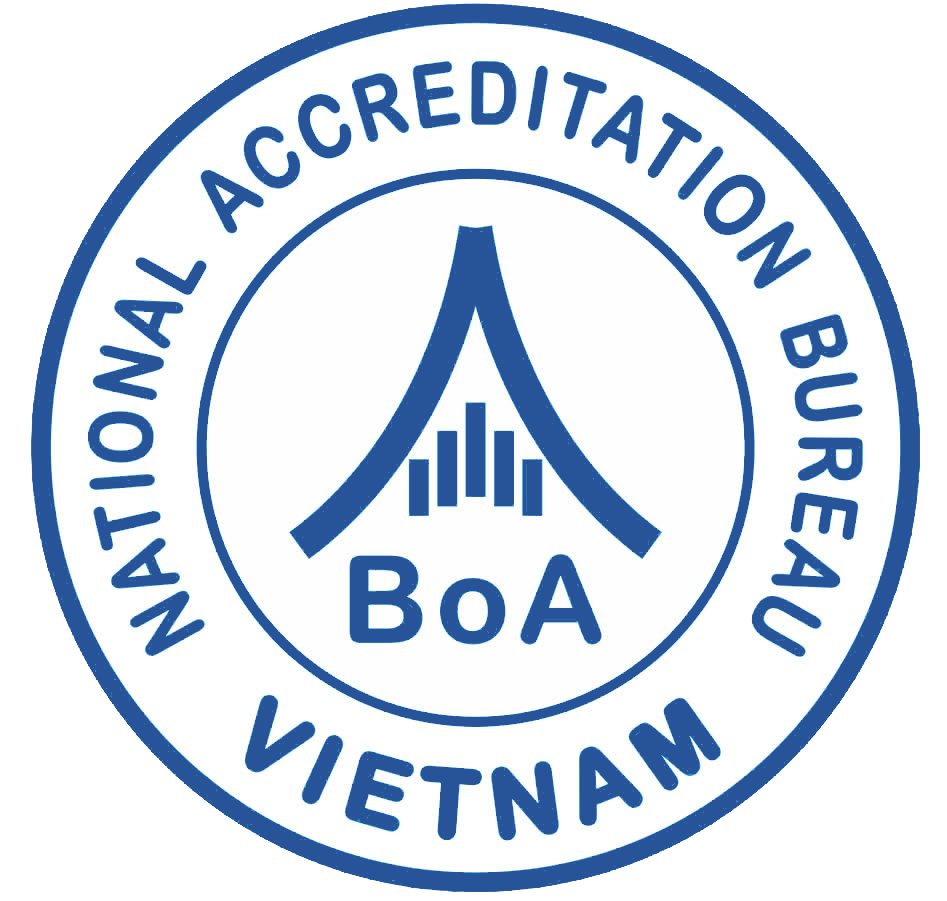Laboratory Management According to ISO 15189 Standards
Understanding ISO 15189
This course introduces participants to the full scope and application of ISO 15189:2022 – the international accreditation standard for medical laboratories.

Quicklinks
Objectives
By the end of the course, participants will be able to:
- Comprehensively understand the requirements of ISO 15189 and the policies of the National Accreditation Bureau (BoA);
- Apply ISO 15189 requirements in practice;
- Evaluate their laboratory’s current status and determine necessary actions to meet accreditation standards.
Target Audience
This course is suitable for:
- Staff at all levels in medical laboratories;
- Personnel responsible for establishing and maintaining the laboratory’s quality management system;
- Individuals preparing for roles in medical laboratory management;
- New employees in medical laboratories;
- Laboratories preparing for ISO 15189 accreditation;
- Regulatory authority representatives.
Course content
- Background and purpose of ISO 15189;
- Quality management system approach;
- General, resource, process, and management system requirements;
- Additional requirements for POCT (Point-of-Care Testing);
- Q&A session.
Related modules
- Introduction
This course introduces participants to the full scope and application of ISO 15189:2022 – the international accreditation standard for medical laboratories. - Objectives
By the end of the course, participants will be able to:
- Comprehensively understand the requirements of ISO 15189 and the policies of the National Accreditation Bureau (BoA);
- Apply ISO 15189 requirements in practice;
- Evaluate their laboratory’s current status and determine necessary actions to meet accreditation standards.
- Target Audience
This course is suitable for:
- Staff at all levels in medical laboratories;
- Personnel responsible for establishing and maintaining the laboratory’s quality management system;
- Individuals preparing for roles in medical laboratory management;
- New employees in medical laboratories;
- Laboratories preparing for ISO 15189 accreditation;
- Regulatory authority representatives.
- Course Content
- Background and purpose of ISO 15189;
- Quality management system approach;
- General, resource, process, and management system requirements;
- Additional requirements for POCT (Point-of-Care Testing);
- Q&A session.
- Introduction
This course provides medical laboratories with the skills to develop, apply, and maintain management system documents in compliance with ISO 15189. - Objectives
Participants will learn:
- Key concepts and ISO 15189 requirements for documentation and document control;
- How to create different types of documents simply and clearly;
- Step-by-step document development and implementation processes.
- Target Audience
- Laboratory personnel responsible for drafting or reviewing documents;
- Quality managers and those in charge of maintaining documentation systems;
- Individuals preparing to write laboratory documentation;
- Laboratories preparing for ISO 15189 accreditation.
- Course Content
- Documentation system concepts;
- Requirements for quality manuals, procedures, methods, and instructions;
- Basic structure and control of documentation;
- Practical exercises;
- Q&A session.
- Introduction
This course teaches how to select, verify, and validate examination methods in accordance with ISO 15189. It draws from international guidance and is tailored for various test types and techniques. - Objectives
Participants will understand:
- ISO 15189 requirements for examination method selection and validation;
- Types of test methods;
- Step-by-step verification and validation, including planning, experimental design, statistical analysis, and criteria publication.
- Target Audience
- Technical managers responsible for method implementation;
- Staff preparing for technical management roles;
- Individuals seeking knowledge in method validation.
- Course Content
- Key concepts of method validation;
- ISO 15189 requirements for method suitability;
- Method classification and related advantages/disadvantages;
- Accuracy and related performance parameters;
- Six-step validation process (planning, prerequisites, testing, analysis, reporting, decision-making);
- Case studies;
- Q&A session.
- Introduction
This course provides knowledge and practical tools for evaluation of measurement uncertainty in medical laboratory test results, based on international guidance. - Objectives
Participants will:
- Understand core concepts of measurement uncertainty;
- Identify documents and guidance on uncertainty evaluation;
- Apply basic rules and practical steps for building and declaring uncertainty budgets.
- Target Audience
- Technical staff responsible for implementing and evaluating measurement uncertainty;
- Future technical managers;
- Individuals seeking practical skills in uncertainty evaluation.
- Course Content
- ISO 15189 requirements on measurement uncertainty;
- Key definitions and evaluation approaches;
- Bottom-up and top-down evaluation methods;
- Case studies and exercises;
- Q&A session.
- Introduction
This course equips medical laboratories with the knowledge and skills to conduct internal audits in line with ISO 15189, following the principles of ISO 19011. It is suitable for both newly implemented systems and accredited laboratories.
- Objectives
Participants will be able to:
- Understand internal audit requirements under ISO 15189;
- Recognize audit types and audit planning procedures;
- Identify qualifications and roles of internal auditors;
- Prepare and conduct audits and write effective reports.
- Target Audience
- Staff assigned to internal audit duties;
- Laboratory quality system managers;
- Prospective internal auditors;
- Individuals seeking skills in internal auditing for medical labs.
- Course Content
- Internal audit concepts and ISO 15189 requirements;
- Auditor roles and responsibilities;
- Audit process and techniques (checklist preparation, interviews, evidence gathering, reporting);
- Case studies;
- Q&A session.
- Introduction
This course focuses on ensuring the validity of examination results in medical laboratories through quality assurance programs, data analysis, and statistical control. It also includes policies and procedures for Proficiency Testing (PT) and Interlaboratory Comparisons (ILC) as required by National Accreditation Bureau (BoA). - Objectives
Participants will:
- Understand concepts related to result validity;
- Apply ISO 15189 and BoA requirements on PT and ILC;
- Organize and evaluate quality assurance programs;
- Analyze data trends using statistical tools.
- Target Audience
- Technical managers;
- Staff aiming for technical management roles;
- Individuals seeking expertise in result quality assurance.
- Course Content
- Validity assurance concepts;
- Internal quality control implementation;
- BoA policies on PT and ILC;
- Provider and program selection;
- Organizing and evaluating ILC participation;
- Data analysis and statistical tools;
- Q&A session.
- Introduction
This course provides a comprehensive approach to risk management in medical laboratories, from identifying risks to implementing control measures and evaluating effectiveness. The content aligns with ISO 15189 and ISO 31000 principles. - Objectives
Participants will:
- Understand risk management principles and processes;
- Apply risk management in daily laboratory operations;
- Develop procedures for risk identification, classification, control, and monitoring;
- Recognize risks including those affecting impartiality;
- Build comprehensive risk management skills.
- Target Audience
- Laboratory managers responsible for system implementation;
- Staff assigned to risk management duties;
- Prospective management staff;
- Individuals interested in risk management for medical labs.
- Course Content
- Risk management concepts;
- ISO 15189 requirements;
- ISO 31000 framework and processes;
- Risk management procedure development;
- Risk classification and mitigation techniques;
- Group exercises and case studies;
- Q&A session.
Register
| Date | Location | |
|---|---|---|
